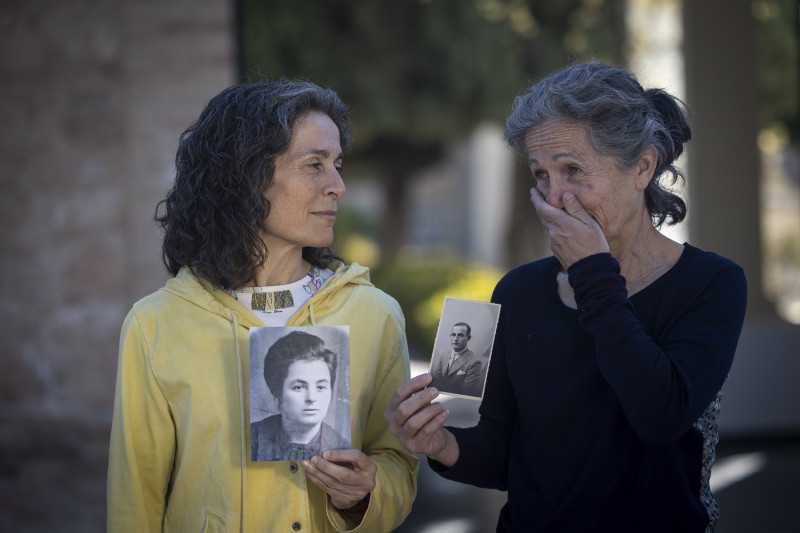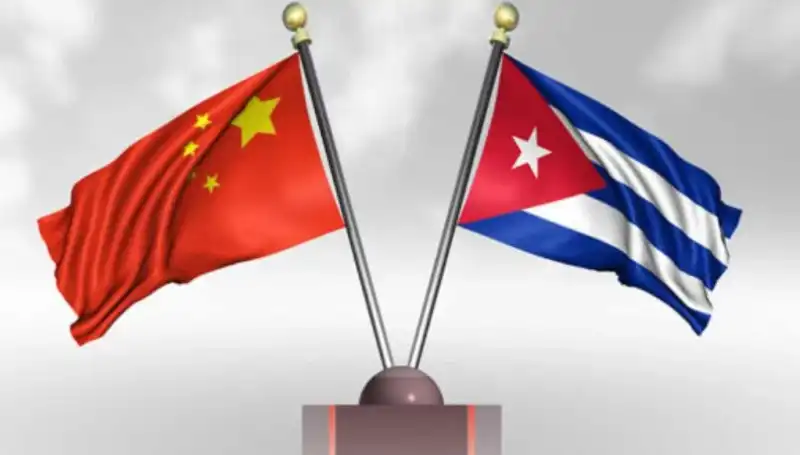
The cemetery of Paterna, barely ten kilometers from the center of Valencia, is a busy place these days. Upon arrival, a group of archaeologists from the Scientific Association Arqueoantro is digging, in search of mass graves in the left-hand-side quadrant, while another team of archaeologists is exhuming mass grave 41 where they have just found the remains of various victims of Francoism. All before the attentive gaze of a group of high school students who are visiting the cemetery with their history teacher.
Antonia and Raquel Sanjuán España are two sisters searching in mass grave 41 for their great-grandmother Antonia Cerdá Revilla, who was an alderwoman in Alzira (Valencia) during the government of the Republic and was executed in Paterna on 11 September 1940, at the age of 53. “My great-grandmother Antonia was a day worker for the fruit exporter in her village, where she became president of the Sociedad de Mujeres Obreras La Unión (Society of Women Workers the Union) and later on the first woman on the Council”, they explain with some pride, adding that “when she was detained, they shaved her head and paraded her around the village”. It is not the first time that these sisters have begun the search for a family member who had fallen victim to Francoism. Their grandfather, Ricardo España Cerdá, Antonia’s son, was also imprisoned and sentenced to death. On 18 January 1940, at the age of 27, he was executed and buried in mass grave 113, together with another 50 victims. There he remained until 2017 when the Arqueoantro team dug up the grave in one the first scientific exhumations thanks to the Ley de Memoria Democrática (Law of Democratic Memory). Antonio was one of the eight people identified through DNA tests and his remains have since 2019 been at rest alongside his wife, Paquita, at the Alzira cemetery. Paquita, who brought up the family alone, died one year before the exhumation began, never imagining that it may have been possible to recover the bones of her husband. “We can tell you very few stories, because silence prevailed in the family”, the Sanjuán sisters said mournfully. The silence was so great that when they went to search for the file of their grandfather, the archivist informed them that their great-grandmother had also been executed. Since then, they have sought to uncover the history of their family. “The photo of my grandfather had always been prominent in the dining room of the family home, but nobody spoke of him. And we knew nothing of my great-grandmother”, Raquel said earnestly. She thought “if there was a secret in my family it was because of something bad”. “That bothered me”, she went on, “and I felt really ashamed about my family. That’s why I started to search, so as not to be uncomfortable about my past”.
Paterna cemetery is the first in the Community of Valencia in which there is evidence of an execution by firing squad after the Civil War, on 3 April 1939, and it houses the second largest number of victims by firing squad in the post-war period. That bloodshed lasted until 1956, the date on which the last execution of an anti-Francoist guerrilla fighter took place. Scattered around the cemetery, there are some 150 mass graves into which the victims of Francoist repression were thrown after having been executed at el Terrer, a wall situated some 500 meters from the holy ground. Estimates speak of 2,238 people from different parts of Valencia and the rest of Spain. Men and women committed to the defense of the values that the Second Republic represented: liberty, equality, progress, solidarity, and citizenship. Paterna was thereby converted into the big mass grave and symbol of the historic memory in Spain. The work of exhuming these graves is fundamental, so that the families may end a mourning that is not yet over.
Equating victims and executioners
While the archaeologists are at pains to exhume the last mass graves, the first stages of the proceedings of the so-called Ley de Concordia, proposed by the PP and Vox, are being debated in harsh tones at the Cortes Valencianas (Regional Parliament of Valencia). The proposed law has provoked a lot of controversy by comparing the victims of Francoism and the dictatorship with the victims of both the Republic and ETA. Although the law dismantles public institutions connected with the historic memory and ends subsidies for associations, it does recognize the right of the victims of the period between 1931 and the present day to conduct “the investigation, location, exhumation and identification of disappeared people”.
In Paterna, Mezquida made it clear to us that, “we are close to having exhumed 1,500 victims of the more than 2,200 that there are in this cemetery”. “Between us all, the teams have exhumed over 50 mass graves of the approximately 150 that exist. It must be taken into account that the largest mass graves have been exhumed, those with over 100 victims. A lot of work has been done. The most difficult ones remain, the most decomposed ones, or those whose dates are not exactly known”.
A large part of this work could be done thanks to the Law of Democratic Memory and the progressive El Botànic (coalition) governments. Rosa Pérez Garijo, former minister with responsibility for the Democratic Memory in the Community of Valencia explained to CTXT that “since the Diputación de Valencia (Valencian regional government) started to unearth the mass graves of Francoism in 2015, important work has been done that was continued by the Generalitat (Regional Government of Catalonia). Now, practically all the mass graves of victims are either already open, are being opened, or have been covered over, because we left 421 signed contracts, seven days before my term as a minister ended. When the UN rapporteurs described the Law of Concordia as shameful and said that it violated the rights of the victims – who are victims of crimes against humanity – Mr. Mazón – president of the Generalitat Valenciana – had the gall to say that he had signed the contracts in his government. That is a lie, because they had already been signed and they have to carry them out whatever happens, because they were put out to tender and awarded.” Pérez Garijo showed himself to be less optimistic with respect to other aspects that might be affected by the new administration. “I’m concerned that important questions such as the genetic database for identification purposes are falling by the wayside”, he complained, “because the most important thing at this time is to have a genetic database and to have all the samples over the past 30 years centralized, so that those that cannot be identified with the techniques that exist today may indeed be identified in the future”.
Amparo Belmonte, president of the Federación de Familiares de las Fosas de Paterna (Federation of the Paterna mass graves) expressed herself along the same lines. “It is very important to put the DNA bank into operation now. It makes no sense to be exhuming bodies and not to have the guarantees that those remains may be identified later on”, she emphasized. “You cannot imagine the trauma that this process entails for the families. It is daily work, collecting information every day, releasing data, speaking with Fisabio, the foundation responsible for the DNA bank of the Regional Government. We believe that it is very important that it is made operative at state level. In Paterna, there are more than 100 mass graves, but it is like one huge communal mass grave, and we should be able to cross-reference all the genetic data”.
The findings of skeletal remains in the mass grave left the Sanjuán sisters feeling hopeful, but they know that the DNA tests are a process that can still be delayed by many months. The results of the samples of the last large mass grave that was exhumed, number 95, have been awaited for a year and others were delayed almost four years before the test results were known. The figures for successful matches are in addition very low: barely 15% of the families that provide their DNA sample receive positive results.
For Belmonte, the other important point is the spaces for the Democratic Memory. “We are the families who are saying that, in Paterna, both the wall where our family members were murdered and the horrifying mass graves are places of Memory. When everything is finally exhumed, we are going to campaign for the mass graves to be restored and protected. Although the victims are exhumed, we are going to suggest that the graves are protected and that they remain exactly as they were when our grandmothers left them, so that they are not forgotten. And the other front on which we are working is the Memorial 2238, where we wish to rebury the unidentified bodies and the bodies of people whose families might so desire”. The Memorial that was driven by the families, is now finished with regard to the civil works, but has yet to be given the certificate of final completion and to be handed over to the City Council.
For Ángel González, a direct victim of the Dictatorship and President of CAMDE-PV, “the law is a frontal attack on all the victims. Not being an object of the law as such makes us disappear, it equates us with both victims and executioners. It denies our right to truth, justice and reparation and that the crimes against humanity committed by the dictatorship, on which there is no statute of limitations, may be judged”. Along the same lines, Lucila Aragó, spokesperson of Acció Ciutadana contra la Impunitat del Franquisme (Citizens’ Action against the Impunity of Francoism), underlined that “it is ignominious that the Francoist story has the status of law. That is what the law, ineptly named Concordia, wishes to achieve”. For this activist and victim of late-Francoism, “the roots can be found in the model of the transition that we lived through in the Spanish State, in which the discourse elaborated by the Francoist regime prevailed, a transition based on a pact of silence and impunity, in which the Law of Amnesty represented a key element absolving those responsible for the crimes of Francoism of any responsibility”. Because of that, she stressed “if steps had been taken into the investigation of those crimes, it might be more difficult to justify the Francoist dictatorship. The reactionary and neo-fascist diatribe against the democratic memory highlights that the steps taken in our country in this field have made the Francoist crimes and aberrations evident. The open mass graves speak for themselves”, concluded Aragó.
CTXT asked Susana Gisbert, the State-appointed prosecutor for the Democratic Memory, about the scope of this regional law. “It is evident that it is at odds with what the State law says. It is clear that there is a conflict of jurisdiction and that when it starts to be implemented, we will have problems about how to interpret one thing or another, and up to what point one thing can be done or another left undone. Apart from the content that goes well beyond what the democratic memory is, I think that according to all the conventions to which Spain is a party, a regional law that clashes in that way with a state law cannot technically be sustained, but the Constitutional Court will at the end of the day have to have the last word”. How do you assess the fact that the UN rapporteur has delivered an unfavorable report on this draft law? “As the State appointed prosecutor for Democratic Memory, I obviously have to consider it in a positive light, because they are saying the national law is right, which is the reason why we were appointed state prosecutors, and it is what the state prosecutor’s office is working upon. As a citizen, I’m hurt that an autonomous community overturns all the work that was being done through other entities”.






